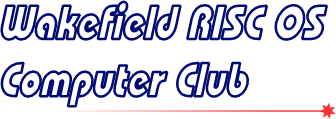Meeting: “Interactive and Entertaining”
An “interactive and entertaining” end to the year: WROCC’s pre-Christmas meeting started with some short animated films and a live demonstration of remote networking. Following that, those present were invited to compete for prizes in the Acorn-themed quiz, before the evening was closed with some more computer-generated animations of a more vintage kind.
Report by Rick Sterry
Having decided that we would not have an auction this year, the question arose as to what on earth we were going to do instead. A few ideas were knocked about in committee, and we decided that the theme would be “Interactive and Entertaining”. Oh yes, and there should be free mince pies! I wasn’t honestly sure how things would work out on the evening itself, as we didn’t have a very structured plan, but it seemed to go quite well in the event.
As the idea was that it should be fairly light-hearted, we started off with Chris Hughes showing us some funny and/or interesting animation files. This went down very well, and the one called “Jeb’s Jobs – Technical Support” was one of the funniest things I’ve seen in a long time, and very nicely animated too. It’s been a big hit with my work colleagues, and you can enjoy it too by visiting www.weakendproductions.co.uk (note the funny spelling), and then clicking on Showreel followed by Jeb Movies. Be aware that some of the other material on the site is unsuitable for children.
After that, Steve Potts showed us some amusing animations of a polar bear called Bernard (aka Backkom), produced by RG Animation Studios in Korea for a French TV series – web site at www.rgstudios.com. They are available on YouTube – just search for Bernard Bear. Try adding the word cactus to the search, and then wince in sympathetic pain as parachuting Bernard encounters those sharp cactus spines. While Steve was setting up for the next part of his ‘slot’, we took the opportunity of sampling the mince pies. They must have gone down all right, in both senses, as there was none left at the end of the evening.
Steve then attempted something interesting, using his A9Home, and a Zoom wireless network router/bridge to bridge the A9Home to the WYSSC network wirelessly. Back at home, he had a firewall router, and behind that an iMac with a web cam pointing at its screen, and a RiscPC on the same network waiting for a VNC connection (VNC stands for Virtual Network Connection, and provides a method of remotely controlling computers). The Mac was configured to ‘wake on modem ring’ and was ‘sleeping’ when he set off from home to the club meeting.
What he did was to find out the network address scheme that WYSSC’s wireless was using, and then set up the Zoom bridge to sit on that network (same subnet), and connect up to the A9Home. Once connected, he could go to an internet web site which was serving the web cam image, and we saw a black screen. Steve then rang the iMac modem on his mobile phone (and rapidly hung up), the machine sprung to life and a refresh of the page confirmed that we were now looking at a web cam image of the iMac screen instead of darkness.
The idea was that having woken the iMac, the firewall would block all traffic except SSH (Secure Shell), with which he would create an ad-hoc encrypted tunnel down which he could send a VNC connection to either the RiscPC and/or the iMac itself. Unfortunately, the connection just timed out, so it looks as if the SSH was blocked somewhere along the route – Steve wasn’t sure why.
It was an ambitious thing to try ‘live’ without having set up and tested it all beforehand, and it half worked. Although Steve was rather disappointed, it was a worthwhile and interesting experiment. He had been previously been successful at a meeting of the Manchester group (RONWUG), and also subsequently from his work location, so I guess that good old Murphy’s Law was operating. I have no doubt that one of these evenings we will see it attempted successfully from WROCC.
Peter Richmond then asked us to form into teams of about four people each, and then tested our little grey cells with 40 questions all relating to computing, and specifically Acorn/BBC and RISC OS. It was quite challenging, but even the team with the lowest score acquitted themselves well with a respectable 25 points. The winning team of Steve Potts, Colin Sutton, Derek Baron and Ian Stanley scored an impressive 36 out of 40, and the runner-up team of Chris Hughes, Terry Marsh and myself scored 33½ points. In fact, if the scoring had been done on the basis of points per person in each team, then we would have won! The winners were able to pick individual prizes, so no problem with them having to split one prize between four of them.
Next, Colin Sutton showed us a little multi-lingual Christmas audio visual presentation that he had made as a demonstration project for his college students back in 1992, using Acorn Mode 15 graphic screens. The Languages of French, German, Italian, Spanish, Swedish, Urdu and English were those spoken by those mixed students. The Christmas candle graphic was from an ArtWorks file, and the college logo and illustration were scanned on an A440/1 with a Computer Concepts handheld scanner.
He then showed us a two-minute demo showreel of a jazz/blues quintet on the open air stage at the 2008 Saltaire festival, the images being synchronised with two demo audio tracks. It was in effect an advert of what they look and sound like in performance. This was followed by some photos that Colin took of a visit to Bradford by Prince Charles, comprising six intimate close-up shots – Colin admitted he was really just showing off! He then rounded off by showing us an AV presentation describing how the diameter of the solid fuel booster rockets on the US space shuttle can be traced back to... well, you can find out for yourself by reading a similar version at www.astrodigital.org/space/stshorse.html. I am not entirely convinced, but it was most entertaining all the same, and raised a good laugh.
The hour was late, and we thought it was all over, when Ian Macfarlane spontaneously sprang to his feet and spent a couple of minutes extolling the virtues of the Medion (aka Tevion) computer and audio-visual products available from Aldi stores. As he rightly points out, some of these are very good quality for the money. I assume Ian has no connection with the company!
Thanks to Steve Potts for providing me with the info about his little experiment, and ditto Colin Sutton about his presentation, as I wasn’t taking notes at the time. You can find out more about VNC and SSH on Wikipedia.
Meeting resources
There are more resources for this meeting if you are a WROCC member: log in to view them.







